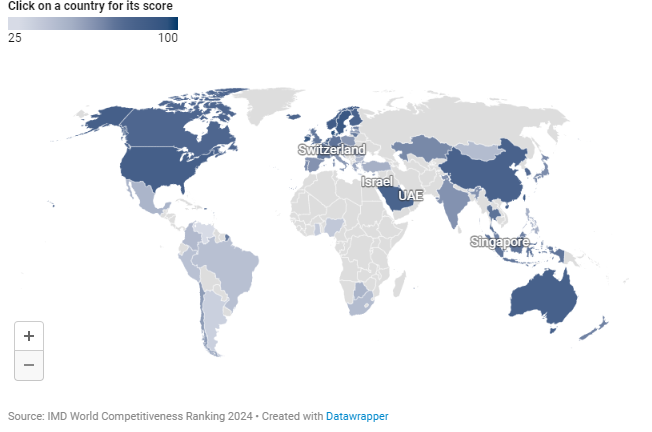The United Arab Emirates has achieved a significant milestone by climbing to 7th place in the Global Competitiveness Ranking, a testament to its robust economic strategies and reforms.
Historically reliant on oil revenues, the UAE started its economic diversification through initiatives like Vision 2021 and Vision 2030. These frameworks focus on expanding sectors such as tourism, finance, and technology, reducing economic risks from oil price fluctuations, and creating a stronger economy.
Infrastructure Development: Building Connectivity and Efficiency
The main contributor to the UAE’s success in the global competitiveness ranking is its substantial investment in infrastructure. Dubai, in particular, has developed world-class airports, advanced seaports, and an extensive transportation network, enhancing regional and global connectivity.
This infrastructure supports efficient logistics and trade, attracting multinational corporations to establish their Middle Eastern hubs in Dubai, significantly boosting the Dubai real estate market.
The UAE’s pro-business environment is a significant factor in its global competitiveness. Dubai offers numerous free zones with tax incentives, streamlined regulations, and initiatives to support startups and SMEs. This has created an entrepreneurial ecosystem, attracting foreign direct investment (FDI) and encouraging innovation.
Initiatives such as the Dubai Future Foundation and Abu Dhabi’s Hub71 further cement the UAE’s position as a hub for technological advancement and business growth.
Innovation and Technology: Pioneering the Future
Innovation is at the heart of the UAE’s competitive strategy. Dubai has invested heavily in smart city projects, renewable energy advancements, and AI adoption, positioning itself as a leader in the Fourth Industrial Revolution. These efforts not only improve productivity and efficiency but also place Dubai at the forefront of global technological development, making it a prime location for real estate investment due to its growing tech-driven economy.
A skilled workforce is crucial for sustainable growth. The UAE, particularly Dubai, has focused on education and workforce development by partnering with prestigious international universities and implementing vocational training programs. These initiatives ensure a capable and competitive workforce that is ready to meet the dynamic demands of a global economy.
The UAE’s commitment to sustainability is evident in projects like Masdar City, a hub for renewable energy and sustainable technologies. Dubai’s efforts in environmental stewardship and climate change mitigation are crucial for long-term prosperity. Additionally, the UAE’s geopolitical stability and proactive diplomacy reinforce its reputation as a safe and reliable investment destination, making Dubai a secure choice for real estate investments amidst global uncertainties.

Dubai’s Real Estate Market: A Hub of Opportunities
Dubai’s rise in global competitiveness has significantly impacted its real estate market. With continuous infrastructure development, business-friendly policies, and a focus on innovation, Dubai has become a prime destination for real estate investments. The city’s strategic location, state-of-the-art facilities, and stable economy make it an attractive option for investors looking for lucrative opportunities in the Middle East.
The UAE’s climb to 7th place in the Global Competitiveness Ranking is a reflection of its visionary leadership and strategic initiatives across various sectors. Dubai, as a leading city, exemplifies this progress through its robust infrastructure, pro-business environment, innovation, and sustainability efforts.